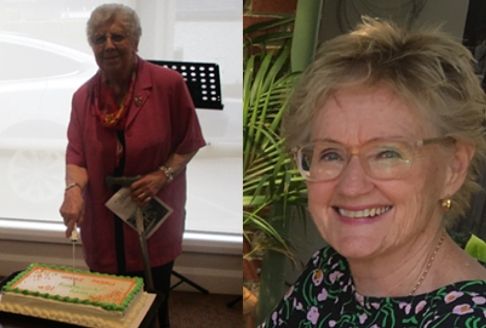National Volunteer Week at Baptcare
- 10 Aug 2020

National Volunteer Week is a great opportunity to celebrate the incredible contribution of our 1000 volunteers. Here are just 2 stories describing the wonderful people that bring so much to our Baptcare community.
Evelyn Wakeling has volunteered at Baptcare for an incredible 30 years, as the pianist for the Chapel services at the Hedley Sutton and Karana communities.
Evelyn begins playing the piano before the residents are brought by carers to the Chapel – her presence known to the residents by the music flowing through the building. She hears them humming along to the music on arrival in the Chapel. “The people love to sing the old hymns,” says Evelyn.
When asked about her experience Evelyn shares, “I love it, it’s something I can do without thinking. I love to play the piano; I have played since I was 5 years old. I get to know the residents and provide ministry to them after the service and I know it is something they enjoy. They may not know the words, but they know the melody, it is something they grew up with.”
Now living in Ferntree Gully, Evelyn makes the long drive to Hedley Sutton every Monday and Thursday. Last year, she was awarded a certificate of recognition for 30 of volunteering. Baptcare acknowledges this wonderful commitment and thanks Evelyn for serving others in this way.
As a social worker of many years Jen Mitchell has a deep appreciation for the importance of positive influence amongst parents and young children. Following her retirement in 2013 she saw the opportunity to bring that rich experience to the Bendigo Homestart team. Jen was impressed by the training program for Homestart Mentors and immediately felt part of the team.
Since completing the training Jen has worked with four very different families but has found common ground with each of them. Jen takes a slow approach, helping families to navigate challenges as they arrive. She enjoys watching the growth of parents and children, knowing that strong foundations are being developed.
When asked about her motivation for volunteering Jen responded, “I guess I feel that I’ve had a pretty good life. I had loving parents and a good education, and I’ve been able to work in an area that I enjoyed and felt (mostly!) competent in. But my work also brought me close to the great struggle that life can be for some people. And that is more often around systems and the way our communities run, rather than some innate fault in the people themselves”.
Jen is grateful for the connections she has made and doesn’t necessarily feel the need to be recognised or thanked. She acknowledges that being valued within a supportive team brings that recognition every week. “It’s been a great thing to be a part of and I hope to continue for some time yet”.
Community news
-

Back to School Tips for Foster and Kinship Carers
Heading back to school can be exciting, but it can also bring up big feelings—especially for kids in care. Here are a few simple ways to help make the transition smoother.
- 17 Apr 2025
-

Easter Reflection from Emily Booth of our Spiritual Care Team
A few years ago, at Easter, I was staying with my sister and her family for the weekend. One afternoon we were all sitting around chatting and the kids were playing when my sister came into the room and placed a tray of fresh, warm hot cross buns on the table
- 16 Apr 2025
-

Student Volunteer Spotlight - Erin
Did you know that Baptcare has student volunteers at some of our Residential Aged Care communities? Our volunteers are an integral part of our Baptcare community, not only in residential aged care but across many of our programs and services. Volunteers provide essential connection, positivity and assistance to residents, clients and consumers.
- 04 Apr 2025
